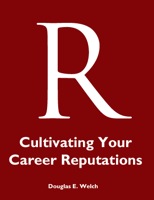Funerals have a way of sharpening your perspective on everything. The father of friend died unexpectedly this week. He had also become our friend over the years, helping us with legal and corporate issues in our small company. I also worked for him, providing computer assistance. As I talked with his wife after the services, she related how I would need to stop by soon to help her sort out all the information that was stored in their computers and help her put things in order. What’s even more striking is, this is not the first time I have had this discussion with someone.
Podcast: Play in new window | Download
Subscribe: Apple Podcasts | RSS
Now available from Douglas E. Welch and Amazon.com
Cultivating Your Career Opportunities by Douglas E. Welch
11,000 Words
While we often talk about having one, monolithic, Reputation – with a capital R — I believe that there are a series of reputations that combine to create the whole. It is often said you can’t “do” projects, you can only do the individual tasks that make up the project. The same can be said for reputation. You don’t build your reputation as a whole, you cultivate the smaller reputations that create it. Each individual action builds your reputation in unique ways and each requires some thought as to how they relate to the whole. Cultivating Your Career Reputations examines each of these reputations in detail and helps you find specific areas where you can improve your work, your actions and your thoughts so that your overall professional reputation can grow
Working in high-tech often means working very closely with people and developing relationships that go far beyond the usual situation of employer and employee. Over the course of your career, many people will become family. You need to be prepared for the eventualities of life, in both your own life and the lives of those around you.
As we grow older, we all prepare for the day when we die. We create our wills, buy insurance, and create Trusts, all in an effort to make it easier for our family and friends when we pass. In addition to all the usual arrangements, though, all of us need to consider the new, computerized world in which we live. In the past, our children may have sorted through paper documentation, but now, more and more, of our lives are bound up in our computers, our email and many other personal and business-related documents.
Computer issues might seem a shallow thought compared to the other issues surrounding a funeral, but in today’s world, it is very important. In the last 2 years, I have faced this issue with several clients and, as I work with many older people in my consulting work, I am sure to face it more as the years pass. To that end, I am developing plans for all of my clients that can help make computer issues less of a concern when the time comes.
First, every member of the family should have some concept of where family data is stored, passwords needed for access and backups in the event that anything happens to the family home. Too often, I find myself digging for passwords or even attempting to crack passwords in an effort to access data. Data could be scattered among several directories or even several computers. None of us likes to think about death, but I try to keep, in the back of mind, the old adage, “I could get hit by a bus tomorrow.” We never know what is coming and the only way to insure that our families can continue with as little trouble as possible is to prepare today.
Next, insure that backups of data, even if they are relatively old, are placed in several locations. Family members should share backups with other family members and friends. You may never need this information, but if you do, it will be extremely important to access it easily.
Clean out your paper files and label everything religiously. It should be obvious where to find a variety of information no matter who might be searching. If your son or daughter can’t find the deeds to property, life insurance policies and more, get to work today. They won’t need further difficulties at an already difficult time.
Have I prepared enough myself? Probably not, but each passing funeral brings more urgency to the task. My own wife jokes of how she will have to call in a close friend to sort out my hard drive when I am gone. In making my own preparations, though, I can learn to develop systems and advice for my clients.
As I see others struggle through their times of loss, and how our computerized lives can make it more difficult, I am re-dedicating myself to removing as many obstacles as I can, both for my clients and myself. I hope you will use these guidelines as a start for your own preparations. No matter what your age, you need to consider how your high-tech work impacts those around you at one of the most stressful times in their lives.
***



